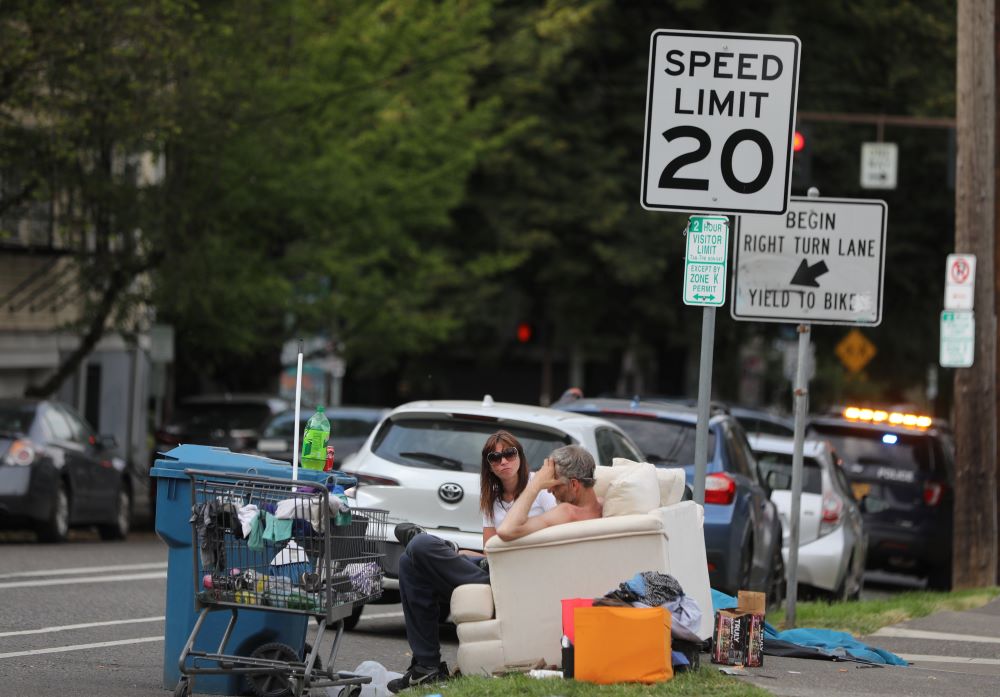
Homeless people chat on a couch outside St. Mary Cathedral of the Immaculate Conception in Portland, Ore., July 5, 2022. The U.S. Supreme Court ruled June 28 that a Grants Pass, Ore., law restricting homeless camps does not constitute cruel and unusual punishment. (OSV News/Bob Roller)
In Portland, one of the West Coast cities grappling with a large and growing homeless population, Catholic Charities of Oregon runs a tiny home village for formerly homeless women — where they can live communally, receive case management, decorate their own walls with art and photographs, and lock the door at night.
Recently, a group of homeless campers began living near that community, known as Kenton Women's Village, with some individuals bothering residents, said Rose Bak, chief program officer at Catholic Charities.
"We've been trying to get them to move on because they are causing a safety hazard," Bak said. "But it's really tricky to navigate because they have nowhere to go." Shelters in the city are often full and have a long waitlist, according to a recent city audit.
Yet both agency and church leaders told NCR the answer to the complexities of homelessness is not fines or jail time, an approach many cities could adopt following a major ruling on homelessness by the Supreme Court.
On June 28, the high court upheld ordinances in Grants Pass, a southern Oregon city about 250 miles from Portland, that prohibit people without homes from using pillows, blankets or cardboard boxes for protection while sleeping within the city limit. The ruling, a 6-to-3 vote along ideological lines, affirmed such bans bar camping on public property by anyone, housed or unhoused, and do not violate the U.S. Constitution’s Eighth Amendment prohibition against cruel and unusual punishment — even if no indoor shelter is available.
Justice Neil Gorsuch, writing for the majority, acknowledged that "homelessness is complex" and its "causes are many." But the Eighth Amendment "does not authorize federal judges to wrest those rights and responsibilities from the American people and in their place dictate this Nation's homelessness policy."
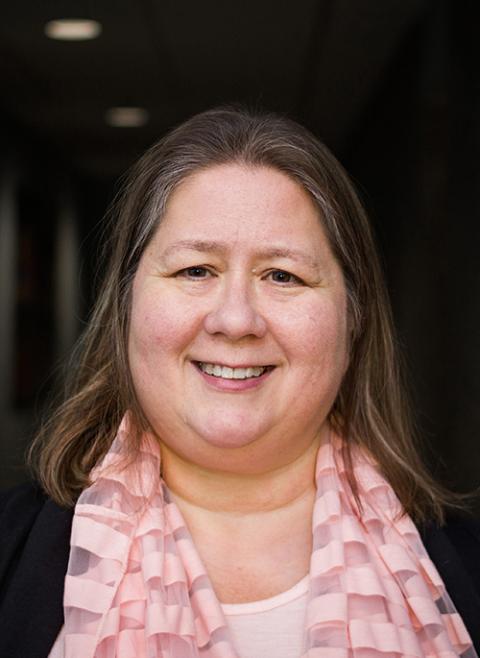
Rose Bak, chief program officer at Catholic Charities of Oregon (Courtesy of Catholic Charities of Oregon)
Homelessness is "very complex," said Bak, agreeing with Gorsuch. But bans are "a simple solution."
"Fines and arresting people are not going to solve this problem and can make it worse," she said.
Dissenting with Justices Elena Kagan and Ketanji Brown Jackson, Justice Sonia Sotomayor wrote it is possible to balance the issues facing local governments, "the humanity and dignity of homeless people, and our constitutional principles."
The majority decision, Sotomayor said, focused nearly exclusively on the needs of local governments "and leaves the most vulnerable in our society with an impossible choice: Either stay awake or be arrested."
'Fines and arresting people are not going to solve this problem and can make it worse.'
—Rose Bak
Kerry Alys Robinson, president and CEO of Catholic Charities USA, said in a statement shared with NCR that "criminalizing homelessness and imposing fines on people unable to pay them are neither practical nor humane solutions."
At the National Alliance to End Homelessness, Steve Berg, chief policy officer, told NCR that 20-30 years ago cities tried the criminalization route and it didn't work.
"We know it doesn’t solve the problem and, in many ways, makes it worse because then you have people who are homeless and they have criminal records, making it harder for them to get a job and rent an apartment," he said.
It is not yet clear whether Grants Pass can immediately enforce its existing bans on homeless individuals or how the ruling eventually will impact Portland, which recently approved a ban allowing people to camp on public property if there are no shelter spots (and Oregon state law puts limits on camping bans). The ruling only changes current law in nine Western states comprising the 9th Circuit Court of Appeals, where much of the country's homeless population lives. But the decision likely will influence homelessness policies in cities across the country.
Several states and cities already have imposed camping bans to address increasing homelessness; a 2023 government count indicated homelessness rose 12% from the year prior, to a record 653,000 people.
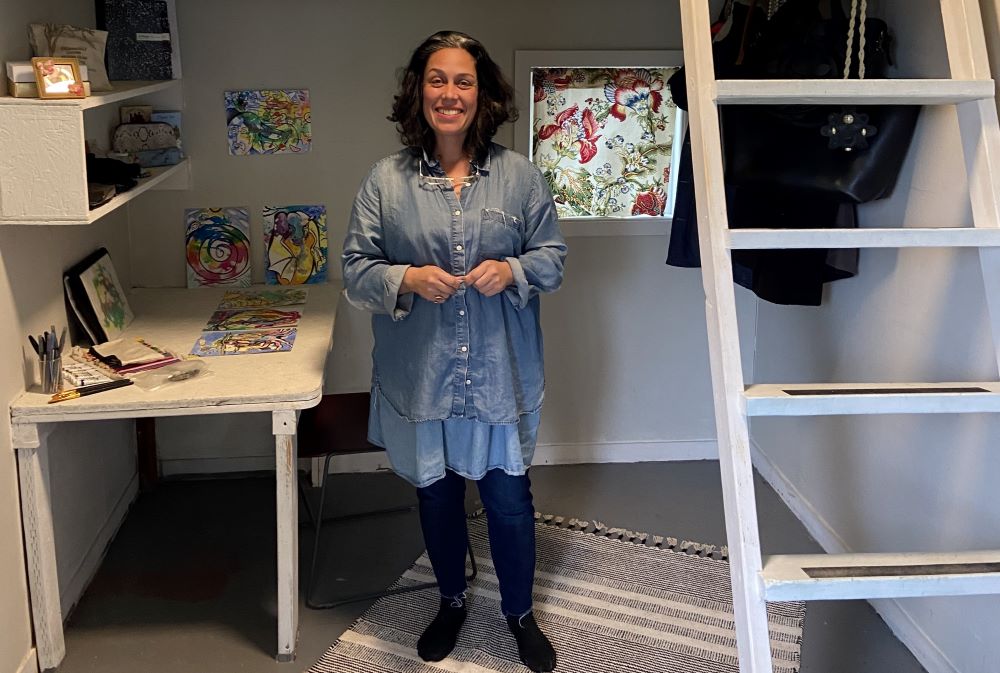
Melanie Rodriguez, a 51-year-old artist and former teacher, stands in her new tiny home at Kenton Women's Village in Portland, Oregon, in fall 2022. (NCR photo/Katie Collins Scott)
Michael Raposa is chief executive officer of St. Vincent de Paul CARES, a social service agency in St. Petersburg, Florida, that runs shelters and housing programs. Florida Gov. Ron DeSantis, a Republican and a Catholic, in March signed a bill banning homeless people from sleeping in parks, on sidewalks and other public spaces.
"We in Florida are headed into a frightening time for the unhoused," Raposa said. He had hoped a different Supreme Court decision might limit implementation of the Florida statute, set to go into effect in October.
In 2013, Grants Pass began to expand enforcement of existing ordinances related to the unhoused population. Violators are required to pay fines ranging from $75 to $295, with figures increasing substantially when unpaid, and penalties potentially include jail time.
Several homeless individuals challenged the constitutionality of the laws, and a federal district court agreed with their stance. The city then appealed to the San Francisco-based U.S. 9th Circuit Court of Appeals, which drew on its 2018 decision in a case from Boise, Idaho, ruling it unconstitutional to arrest people for sleeping outdoors. Grants Pass appealed to the Supreme Court.
Kerry Alys Robinson is president and CEO of Catholic Charities USA. (OSV News/Catholic Charities USA)
Catholic Charities USA and several services agencies signed on to a brief opposing the Grants Pass ordinances, and the U.S. Conference of Catholic Bishops filed its own legal brief in opposition.
Cities both on the West and East coasts asked the Supreme Court to back Grants Pass, and Democrat and Republican lawmakers weighed in — many saying the 2018 ruling hampered efforts to manage homelessness encampments and keep communities safe.
California Gov. Gavin Newsom praised the Supreme Court's decision and said in a statement it provides state and local officials "the definitive authority to implement and enforce policies to clear unsafe encampments from our streets."
Gorsuch wrote the Eighth Amendment "focuses on the question what 'method or kind of punishment' a government may impose after a criminal conviction, not on the question whether a government may criminalize particular behavior in the first place." He also said the fines and jail sentences in the Grants Pass case do not "qualify as cruel and unusual."
While it's true "they are not unusual, I do think they are cruel," Bak told NCR. Even low-level fines "for someone who has nothing are as bad as a $10,000 fine for somebody else."
Bak said services agencies, including Catholic Charities, often help people pay off fines that prevent them from securing housing. "So really what this is going to do is transfer the burden of the fine to an already underfunded homelessness system," she said. That means agencies ultimately would help fewer people, she said.
Berg noted additional ways using the criminal justice system to deal with homelessness makes it harder for agencies like Catholic Charities. "It means the people they are trying to serve are going to be more distrustful of law enforcement," he said. And if an individual is arrested and spends time in jail, efforts by their caseworker to help them build relationships with potential employers or landlords "will go backward or have to start from scratch once they get out of jail."
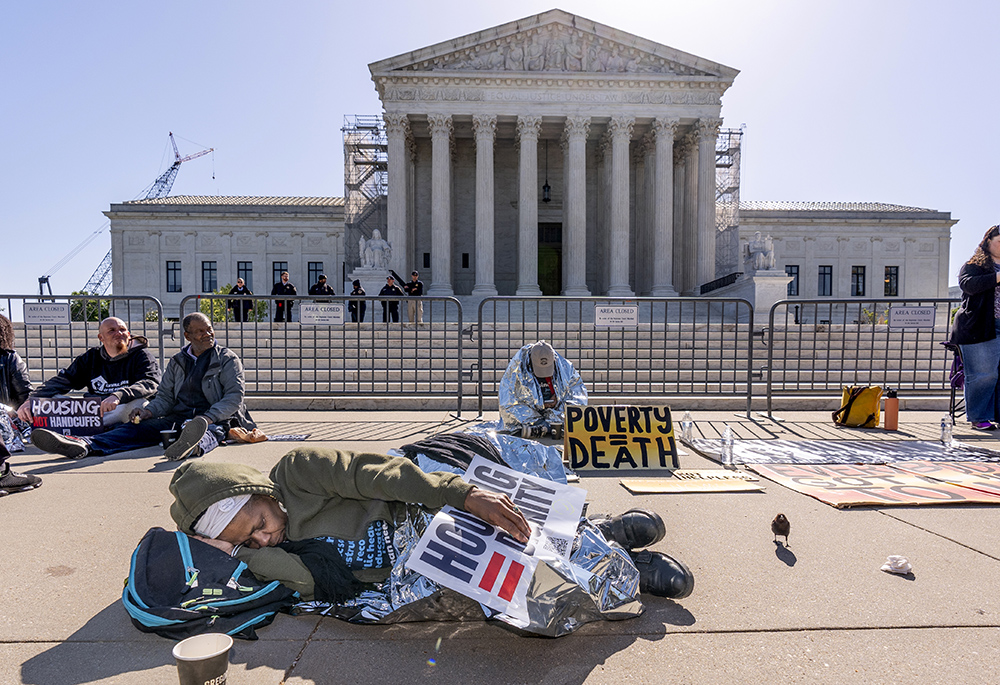
Activists demonstrate at the Supreme Court as the justices consider a challenge to rulings that found punishing people for sleeping outside when shelter space is lacking amounts to unconstitutional cruel and unusual punishment, on Capitol Hill April 22 in Washington. (AP photo/J. Scott Applewhite)
Bishop Joseph Tyson of Yakima, Washington, sits on the subcommittee of the U.S. bishops' Catholic Campaign for Human Development, part of the Department of Justice, Peace and Human Development. (In a surprise move, leaders of the U.S. Conference of Catholic Bishops recently significantly reduced department staff.)
Tyson said he could perhaps see the wisdom in trying to have decisions about homelessness addressed at the local level and he understands caring for the common good includes the whole community, not only the unhoused. "But I'm very concerned that we not criminalize homelessness," said Tyson. "I don't think just arresting people for being homeless is the solution."
Although the high court's decision seems to settle the constitutional questions, it "does nothing to change the fact that thousands of people are without adequate let alone dignified shelter or housing," said Scott Kerman, executive director of Portland's Blanchet House, originally founded in the model of a Catholic Worker house of hospitality and providing shelter, meals and clothing to those in need.
"The suffering these individuals endure is extraordinary, and I'm grateful that there are organizations like Blanchet House who are ready to alleviate suffering, offer compassion and promote hope," Kerman said.
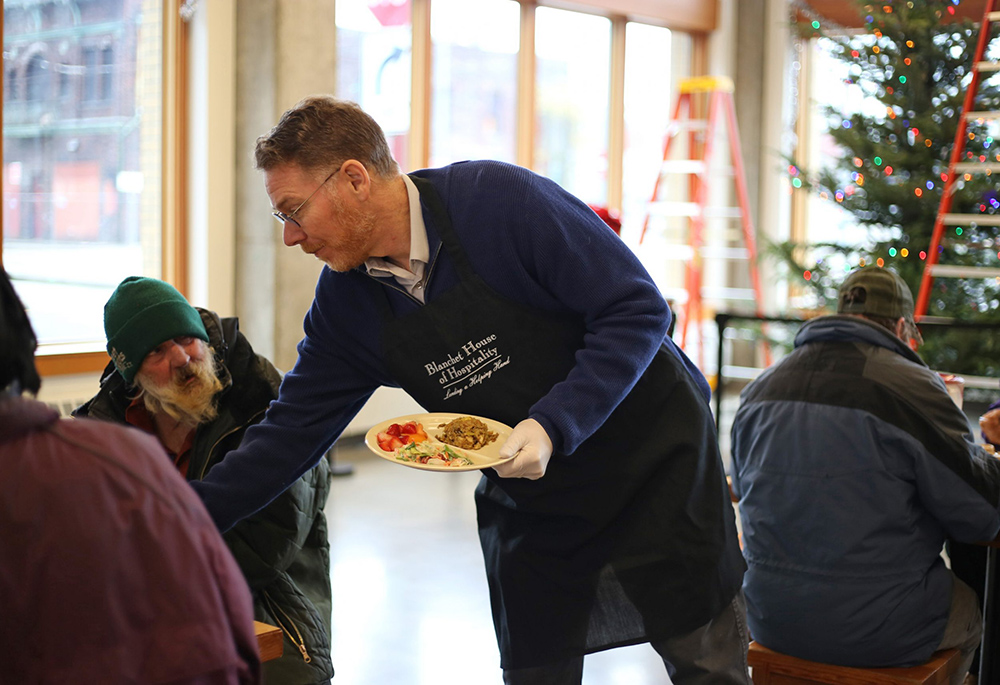
Scott Kerman, executive director of Blanchet House in downtown Portland, serves a meal to a guest near Christmas in 2019. (Courtesy of Blanchet House)
In response to the decision, leaders at the U.S. Conference of Catholic Bishops and Catholic Charities USA emphasized Catholic social teaching and more robust affordable housing and social policies.
"Policies that criminalize homelessness are a direct contradiction of our call to shelter those experiencing homelessness and care for those in need," said Archbishop Borys Gudziak of the Ukrainian Catholic Archeparchy of Philadelphia. Gudziak is chairman of the bishops' justice, peace and human development department.
This decision, said Gudziak in a statement, "fails to affirm the inherent dignity of a person, which is properly recognized by the constitution."
Instead of punishing the most vulnerable, the government should help provide shelter and economic and social programs "that uphold and enhance the dignity of homeless persons," he said.
Robinson, at Catholic Charities, said the Catholic Church teaches access to safe housing is a basic human right. "Our country desperately needs to address a severe lack of affordable housing and related rising rates of homelessness," she said, adding that around the country Catholic Charities agencies continue to develop effective programs for the unhoused.
Advertisement
In Portland, Bak said some women at Kenton Women's Village have become homeless at least partially as a result of domestic violence — and those in the nearby encampment have their own stories.
Homeless youths she's worked with found themselves houseless because of a poor foster care placement or because they'd been disowned due to their LGBTQ status, Bak said. "We also see a lot of women who were married and their husband dies and they lose everything because their husband earned the income."
Then some people have mental illness or drug addiction, she said. "There are numerous reasons people become homeless, but once you do, for many it's nearly impossible to get out," she said.
The Supreme Court's decision, she said, may make it even more difficult.






